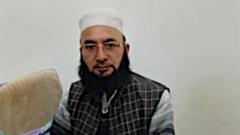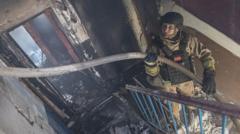This article explores the harrowing experience of Farooq Ahmed as he navigates the aftermath of his brother's death and the subsequent media frenzy that branded him a terrorist despite his innocence.
Branded a Terrorist: The Impact of Media Misinformation on Grieving Families in Kashmir

Branded a Terrorist: The Impact of Media Misinformation on Grieving Families in Kashmir
The family of Mohammad Iqbal, who was killed in cross-border shelling, faces the dual tragedy of loss and defamation by media outlets.
Farooq Ahmed's grief over his brother Mohammad Iqbal's death has been compounded by the media's portrayal of him as a terrorist. Iqbal, a teacher at the Zia-ul-Uloom madrassa in Poonch city, Indian-administered Kashmir, was killed in cross-border shelling on May 7, a day after India's retaliatory airstrikes. The day began with Iqbal heading to work, but ended with his family burying him, unaware of the false narratives that would soon spread.
Once the news of Iqbal's death reached the media, several channels quickly labeled him a terrorist, citing his appearance as justification. This characterization, Mr. Ahmed insists, is utterly unfounded. "My brother was a teacher but they saw his beard and skullcap and branded him a terrorist," he expressed with deeply felt pain. Media assertions claimed Iqbal was linked to the Lashkar-e-Taiba, a designation that left the family anguished.
In the meantime, the military conflict between India and Pakistan intensified, leading to a torrent of contradictory information on social media and news networks. Sensationalism and misinformation surged, with erroneous claims about events and casualties prompting scrutiny of journalistic practices. Manisha Pande, managing editor at Newslaundry, remarked on the shocking scale of fact-free assertions being aired. "The jingoistic and irresponsible coverage was unprecedented," she noted.
The day after Iqbal's death, the Poonch police issued a statement explicitly denying the terrorist claims. They clarified that Iqbal was a respected figure in the community, but for Mr. Ahmed, the damage was done. "By then, the false claim would've already reached millions," he lamented. Efforts to take legal action against misleading media reports may take time, as the family grapples with financial challenges following Iqbal's death.
Survived by two wives and eight children, Iqbal was the family's only breadwinner, leaving Mr. Ahmed to bear the responsibility of caring for his grieving family. He hopes to lift the veil of media misinformation that continues to portray his brother in a negative light. "How will they understand our pain?" he asked, illustrating the profound sorrow and injustice faced by those wrongfully accused. As this tragedy unfolds, the need for ethical journalism and accurate reporting has never been clearer.


















